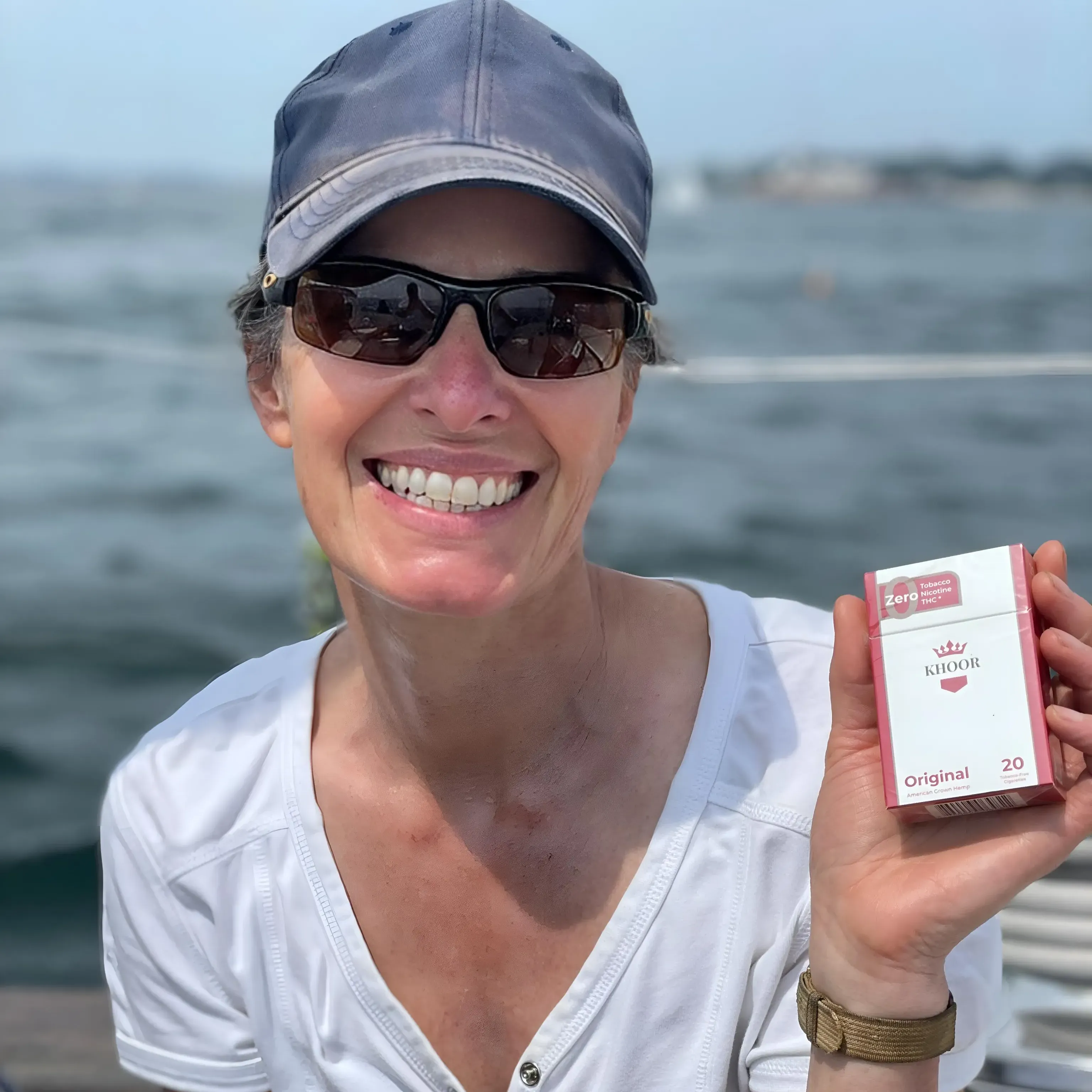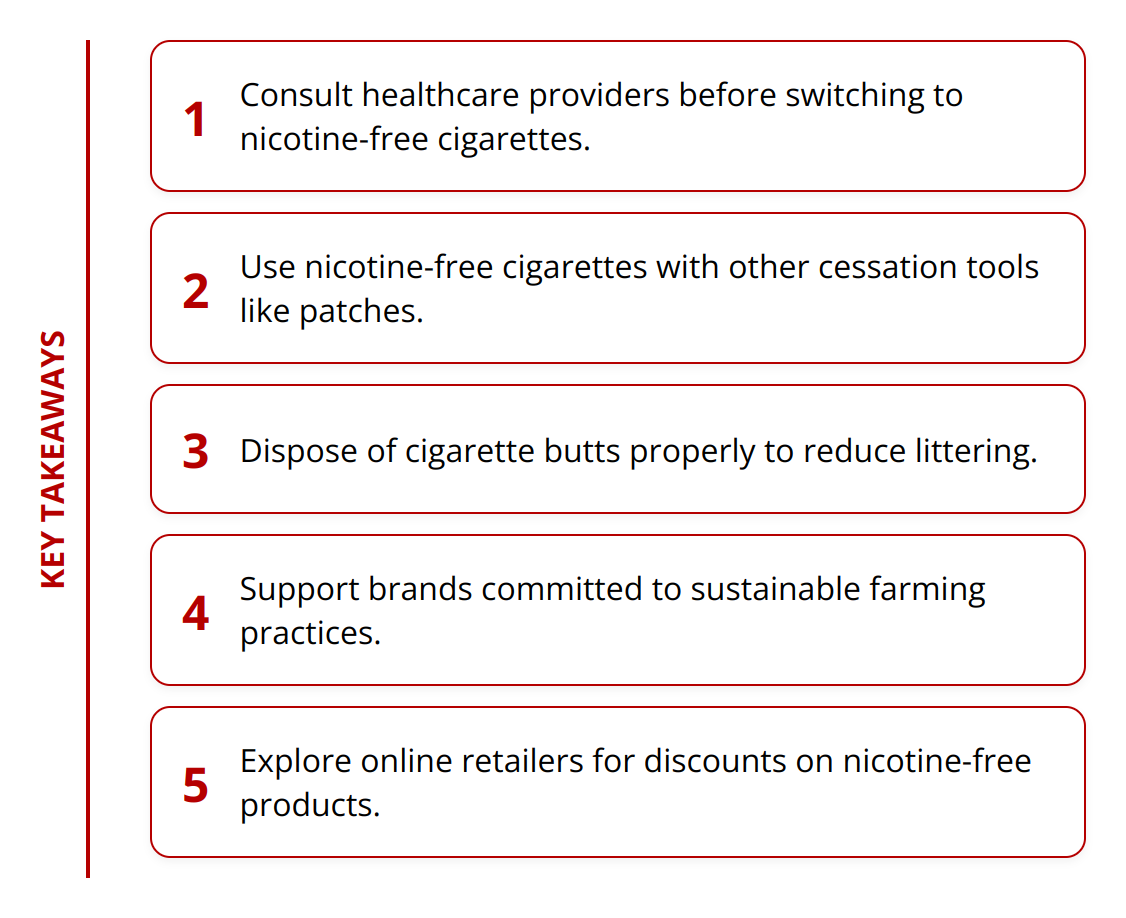
Herbal Smoking Wellness: All You Need to Know
Explore the benefits and tips of herbal smoking wellness with information on health impacts, botanical choices, and DIY blends.

Nicotine-free cigarettes present a compelling case for healthier smoking alternatives.
At KHOOR, we are committed to offering solutions that address both personal health and environmental sustainability.
In this blog post, we’ll explore the significant health benefits, environmental impact, and market trends associated with nicotine-free cigarettes.
Let’s dive into why more people are making the switch.
Nicotine-free cigarettes offer significant health benefits that make them a strong candidate for those looking to lead healthier lives.
Reduced Risk of Addiction: Nicotine is a highly addictive substance. Studies from the National Institute on Drug Abuse indicate that around 80% of people who try to quit smoking relapse due to nicotine addiction. Without nicotine, these cigarettes significantly lower the risk of becoming addicted. This opens the door to easier quitting and reduces the long-term dependency on smoking aids.

Lower Incidence of Heart Disease and Stroke: The American Heart Association states that smoking is responsible for roughly one-third of deaths from heart disease. By eliminating nicotine, these cigarettes could reduce the burden on the cardiovascular system. Nicotine-free options lead to lower blood pressure and decreased heart rate, minimizing the risk of heart attacks and strokes. This can be particularly beneficial for older adults who are more susceptible to heart issues.
Decreased Respiratory Issues: According to the Centers for Disease Control and Prevention, smoking tobacco is the leading cause of chronic obstructive pulmonary disease (COPD) and other respiratory problems. Nicotine-free cigarettes eliminate the toxic chemical concerns linked to traditional tobacco smoke, leading to fewer lung-related health issues. Users typically experience reduced coughing and shortness of breath, making daily activities more manageable.

Practical tips for maximizing health benefits when switching:
For more insights on transitioning away from nicotine, check out our article on the dangers of nicotine.
By making an informed choice, you can make significant strides in your health journey.
Nicotine-free cigarettes can have a positive environmental impact by reducing pollution and fostering more sustainable practices in agriculture.
Lower Toxicity in Waste Products
One of the significant benefits of nicotine-free cigarettes is the reduction in toxicity of the waste products they generate. Traditional cigarette butts are notorious for leaching harmful chemicals into the environment. Research has shown that cigarette butts are the most common form of litter, accounting for roughly 30% of all items picked up during coastal cleanups. By eliminating nicotine—a major toxic component in cigarette butts—nicotine-free alternatives contribute fewer harmful substances to soil and water bodies.

Reduced Chemical Use in Agriculture
The cultivation of nicotine-free tobacco often involves fewer pesticides and fertilizers compared to traditional tobacco farming. The excessive use of these chemicals in traditional tobacco farming has been linked to soil degradation and water pollution. Using fewer chemicals translates to a lesser environmental burden, conserving soil quality and reducing harmful runoff. This shift is not only beneficial for the environment but also supports healthier ecosystems.
Encouragement of Sustainable Practices
The production of nicotine-free cigarettes often aligns with sustainable farming practices, further amplifying their positive environmental impact. For example, some nicotine-free tobacco farms employ crop rotation and integrated pest management to maintain soil health and reduce chemical usage. These methods are beneficial for the environment and lead to more sustainable agriculture.
Practical tips for supporting environmentally-friendly smoking habits:
For more information on how tobacco and nicotine impact the environment, read about hemp in the United States.
Switching to nicotine-free cigarettes not only benefits personal health but also helps mitigate some of the environmental harms caused by traditional smoking.
The shift towards nicotine-free cigarettes is driven by several factors that are shaping market trends and consumer preferences.
The growing demand for healthier alternatives has become increasingly evident. According to the Truth Initiative, approximately 70% of adult smokers express interest in quitting, a trend that caters to the rising popularity of nicotine-free products. Consumers are continually seeking options that align with their health goals, contributing to a rising market for nicotine-free cigarettes.
Awareness of the hazards associated with smoking has also spurred market growth. Campaigns and policies from health organizations such as the World Health Organization have educated the public on the dangers of nicotine and tobacco. This heightened awareness has led to a more informed consumer base that favors nicotine-free options as a safer alternative.
The increased availability of nicotine-free options further supports this shift. Retailers and online platforms are stocking a wider variety of nicotine-free products, making them easily accessible to consumers. For example, let’s look at the wide range of herbal and nicotine-free cigarettes now available online, illustrating this trend in product diversification. This accessibility encourages more smokers to consider nicotine-free alternatives as part of their quit-smoking journey.
<>
Practical tips and trends for consumers looking to switch:
For additional tips on transitioning from traditional cigarettes, refer to this guide on switching to herbal cigarettes.
As nicotine-free cigarettes continue to gain traction, staying informed and exploring available options can greatly enhance the quitting experience, providing both health and environmental benefits.
Nicotine-free cigarettes offer numerous health benefits, including a reduced risk of addiction, lower incidence of heart disease and stroke, and decreased respiratory issues. These advantages make them a healthier alternative for smokers seeking to quit or reduce their nicotine intake. Practical steps like consulting healthcare providers and using smoking cessation aids can maximize these health benefits.

On the environmental front, nicotine-free cigarettes contribute to lower toxicity in waste products, reduced chemical use in agriculture, and support sustainable practices. Proper disposal of butts and choosing brands committed to sustainability can further mitigate environmental harm.
The market for nicotine-free cigarettes is expanding, driven by the growing demand for healthier alternatives and increased awareness of smoking hazards. Retailers and online platforms now offer a variety of nicotine-free products, making it easier for consumers to make the switch.
At KHOOR, we provide a premium, tobacco-free, nicotine-free smoking experience with all-natural herbal cigarettes in flavors like Original, Menthol, Vanilla, and Berry Blue. Our offerings aim to satisfy cravings and rituals without harmful effects. For more information, explore KHOOR’s premium tobacco-free cigarettes.
In summary, switching to nicotine-free cigarettes not only enhances personal health but also supports environmental sustainability and aligns with current market trends. Consider nicotine-free alternatives as a viable option for a healthier and more eco-friendly smoking experience.

Explore the benefits and tips of herbal smoking wellness with information on health impacts, botanical choices, and DIY blends.

Explore how KHOOR supports nicotine replacement with herbal cigarettes, success rates, and user stories for a healthier, smoke-free life.

Explore the benefits of quitting tobacco & nicotine with healthy alternatives. Improve your health and well-being with tips and data-backed advice.

Achieve your quit smoking goals with KHOOR’s supportive approach. Discover benefits, statistics, and practical tips for a healthier life.

Explore practical tips to smoke without nicotine, including product recommendations and real-life statistics to support your healthier lifestyle choices.

Explore tobacco-free alternatives with KHOOR. Learn about options like herbal cigarettes, nicotine pouches, and vaping for a healthier lifestyle.